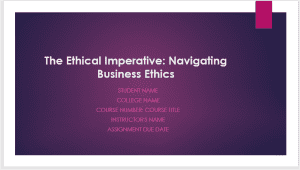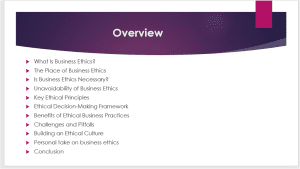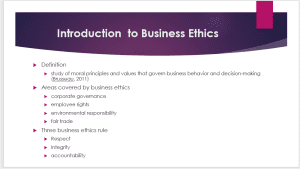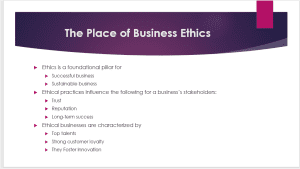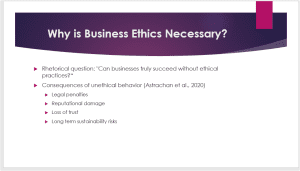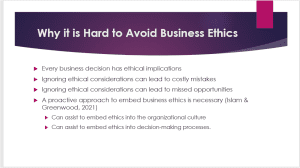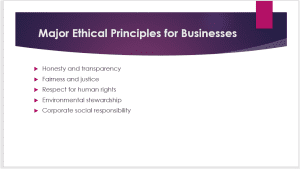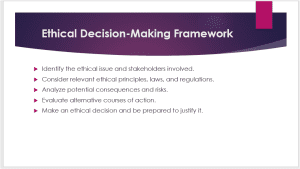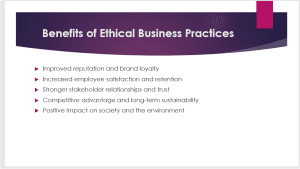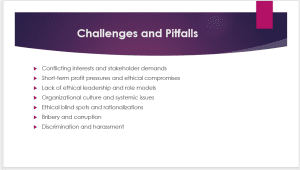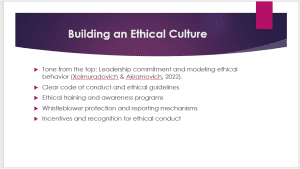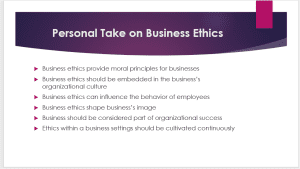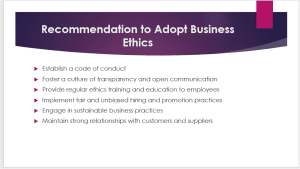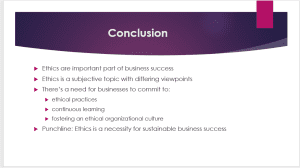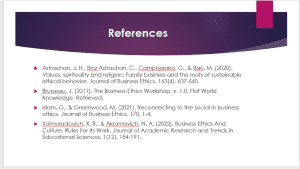The Ethical Imperative – Navigating Business Ethics
Hello, and welcome to the presentation on ethics. It gives insight into the navigation to be adopted by businesses in handling ethical aspects.
The presentation covers important topics related to business ethics. First, business ethics as a concept is introduced before assessing the place of business ethics in business practice. The importance of business ethics is then considered and the reason as to why business ethics cannot be avoided is established. Further, major ethical principles that business organizations should consider are assessed. After that, a framework for ensuring ethical decisions are achieved in organizations is presented. The presentation finishes by identifying the major benefits, challenges, and pitfalls that are encountered in business ethics.
Let’s start with what exactly is business ethics. According to Brusseau (2011), it is the study of moral principles and values that govern business behavior and decision-making. It encompasses ethical considerations across areas like corporate governance, fair trade practices, environmental responsibility, and employee rights and treatment. At its core, business ethics rests on three fundamental pillars. The three include respect, integrity, and accountability. However, the three are not the only ones, and business leaders should always look for other aspects involved in business ethics.
A successful and lasting business depends heavily on ethics. It acts as a cornerstone, impacting different facets of the people involved in a firm. Long-term success requires both building trust and upholding a good reputation, which are fostered by ethical behavior. Because of their dedication to morality and conscientious business operations, ethical companies are renowned for drawing in top talent and having devoted clientele. Additionally, ethical companies foster an atmosphere that supports innovation by promoting originality and progressive thinking. Setting ethics first benefits individual companies as well as the more ethical and sustainable business environment as a whole.
It’s important to consider if companies can prosper without business ethics. The vast weight of the evidence points to the answer no. Serious repercussions from unethical action can threaten a company’s ability to survive. According to Astrachan et al. (2020), businesses that engage in unethical behavior run the risk of facing fines and litigation, both of which can cause considerable financial losses. Furthermore, unethical action can inflict irreversible reputational harm, which can result in a loss of trust from stakeholders like as investors, employees, and customers. A key component of every successful business is trust. Without trust, clients are hesitant to interact with a business, staff members lose interest in their jobs, and investors are hesitant to provide money. Cultivating and preserving trust with stakeholders requires ethical behavior.
Whether we realize it or not, every business decision has ethical implications. Ignoring ethical issues can lead to expensive errors and lost opportunities. Because of this, taking a proactive stance and incorporating ethics into your company’s culture and decision-making procedures from the start is essential. Through proactive resolution of ethical issues, companies can reduce risks, establish confidence with interested parties, and cultivate a favorable image (Islam & Greenwood, 2021). Additionally, it encourages accountability, transparency, and principled leadership, all of which can result in more environmentally friendly and socially conscious practices. In the end, companies that place a high priority on ethics are better able to handle difficult moral decisions, make wise decisions, and take advantage of opportunities that fit with their beliefs and the expectations of society.
There are several principles of ethical business activities to be outlined. They include honesty, suggesting that communication with the customers should be open and truthful. Fairness and justice must be obligatory, and above all, it is ensuring that all individuals are treated fairly and equally. The restoration of human rights is an essential component of promoting what is human and the value of these rights. Environmental stewardship is the care use of resources and the treatment of ecological systems with an understanding of the role people play in their health. Lastly, businesses` commitment to the health of the community and society can be demonstrated through direct participation in the process. Underpinning these principles is the idea that a company also has a soul that the ethical compass should point to and the latter should then be followed by every single thing a business practices.
Correspondingly, the ethics practitioner, while doing real-world stuff, can face diverse obstacles. Dealing with ethical issues can be quite challenging. That’s why I suggest implementing a structured method for making ethical decisions. The next step is to identify the ethical problem and the applicable stakeholders involved. Second, reflect on significant norms, laws, and member-states regulations. Weigh risks and impacts and consider other options besides that one. Now, the last stage is the choice of ethical judgment, which can be defended.
Here, let’s consider exactly how ethical business practices can contribute to business benefits. Organizations that consider ethics have better public recognition, more employee loyalty and advancement and there are more trustworthy stakeholder relationships, more competitive advantage, and stronger long-term sustainability are the main benefits. The firms don’t forget to think about the people and the environment positively.
Even though ethics should be assumed above everything else, it sometimes includes the ethical dilemma. The existence of conflicts of interest such as making trade-offs between profit maximization and social accountability, may represent an ethical challenge. You can also make changes to your website or business to better address environmental concerns. Corporate social responsibility is a way of life intended to save companies from ongoing bottom-line pressure. Leadership that lacks an ethical compass will create an organization that falls short of the basic ethical conduct. The treatment of culture inside the organization as unethical values could be a restraint in the process of adoption of ethics. Besides, ethical inadequacies may also arise if a company fails to notice the ethics behind its actions. Identifying and responding to these issues is essential if companies intend to survive the maze of business ethics efficiently.
Constructing an ethical culture that is completely free from breach of trust inside organizations involves a holistic strategy. It starts with establishing the right tone from the top, where management showcases steadfastness of their morals with explicit acts and drives the message home with subsequent actions (Xolmuradovich & Akramovich, 2022). Imposing clear and thorough behavior codes parents the basis for acceptable behavior. Leading to ethical training programs that are solid, staff learn what to do, when the situation calls for them to make ethical decisions. Whistleblower safety mechanisms are the mechanisms that are created to ensure safe communication channels for disclosing ethical concerns. Besides, keeping incentives for, and awarding for, ethical behavior not only shows that ethical conduct is of significant importance but also remains in every employee’s heart. A perpetuation of ethical culture is enhanced through constant hard work, consistent reminders, and a belief in non-stop betterment.
Business ethics can be understood in different ways by different people. From my personal side, I take business ethics as the framework that ensures businesses are morally responsible. Therefore, there is a need for organizations to embed business ethics as part of the culture that should be upheld by the organization. Notably, this is so because business ethics have the possibility of influencing the behavior of employees within the workplace. Additionally, business ethics can influence the reputation of the business in the public. Therefore, they should be considered in the pursuit of organizational success. It is important for an organization to cultivate ethics in the workplace through a continuous process to ensure that the business remains updated on matters of ethics.
The process of adopting the good business ethics consists of several important stages. Initially, enterprises should create a detailed code of conduct that specifies the ethical standards and expectations. The establishment of a culture of transparency and open communication is the key to promoting the ethical behavior of employees. Ethics training and education should be given regularly so that everyone knows and understands the issue. Equal and impartial hiring and promotion are the keys to the equal opportunities. Being a sustainable business which reduces the environmental damage and is socially responsible is of great importance. Moreover, the strong relationships with customers and suppliers are based on trust, honesty, and integrity, which is the foundation for the ethical behavior in the business.
Ethics is the very basis of corporate excellence. Though it is a highly subjective concept, it entirely relies on individuals’ views and perceptions. To sustain and prosper, businesses cannot turn a blind eye to ethical rules and principles and should rather strive to keep harmony with the world by incorporating integrity, responsibility, and fairness as their sole principles. Learning is an endless process and with the development of ethical standards over time, we must keep exploring new ethics in society. The creation of such a culture in an organization is also very essential; where all the operations are run ethically, and every aspect of the operations is entrenched with ethical considerations. Principles cannot just be viewed as a luxury but a requirement for sustainable growth management, which in turn accounts for business durability, stakeholders’ trust, and society’s positive impact.
ORDER A PLAGIARISM-FREE PAPER HERE
We’ll write everything from scratch
Question
A student should focus on the subject matter from the text that interested them the most, and then develop a PowerPoint presentation that will be submitted at the end of class.

The Ethical Imperative – Navigating Business Ethics
The first slide should be your Introduction slide, the next 10-15 slides should be informational, and the last slide should be the reference slide (the URLs of the pictures or information for citing or referencing your work).
The final project is worth a total of 80 points, 70 from the final presentation, and 10 points are associated with this week’s Final Project Proposal. The description should be 2 to 3 paragraphs about the subject you are going to develop your PowerPoint Presentation on.
The actual final Project Presentation will be due during the final week of the course along with a peer review discussion board due by Weds 11:59 pm of that week.

